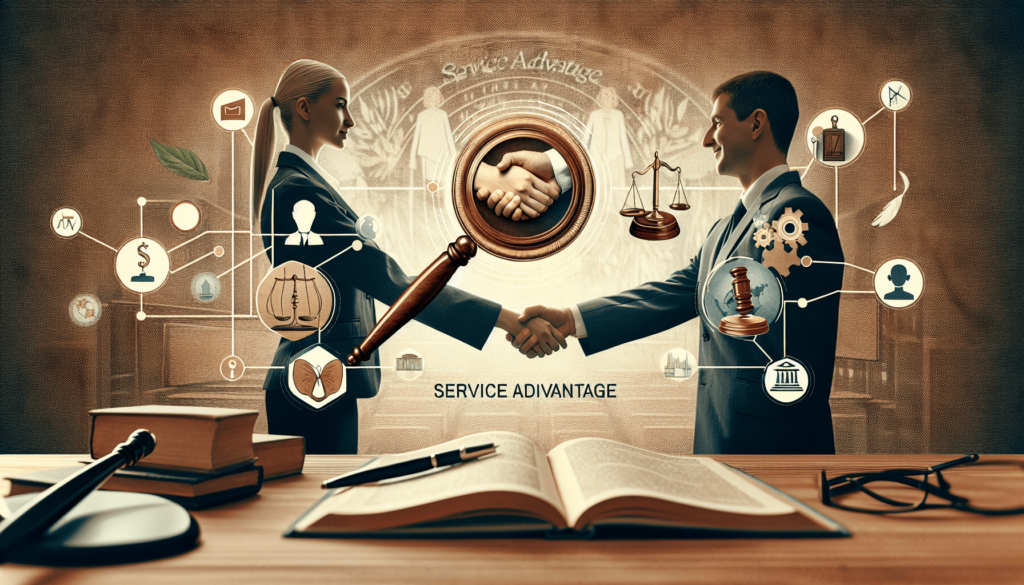In today’s competitive legal landscape, the key to success lies in leveraging expertise to enhance your legal business. By providing exceptional service, you can set yourself apart from the crowd and build a loyal client base. In this article, we will explore how leveraging expertise can give you the service advantage, and ultimately help you thrive in the legal industry. Whether you are a solo practitioner or a large law firm, this is a must-read to unlock the potential of your legal business.
Understanding the Service Advantage

This image is property of pixabay.com.
What is the Service Advantage?
The Service Advantage refers to the unique benefits that a legal business can provide to its clients through the quality and effectiveness of its services. It encompasses a range of factors, including expertise, personalized attention, effective communication, trustworthiness, and meeting client expectations. By prioritizing and effectively delivering on these aspects, a legal business can distinguish itself from competitors and maintain a strong reputation in the industry.
Why is the Service Advantage important for a legal business?
The Service Advantage is crucial for a legal business as it directly impacts client satisfaction and retention. In today’s competitive legal landscape, clients not only seek competent legal professionals but also expect exceptional service throughout their legal journey. By providing excellent services, legal firms can enhance client satisfaction, foster strong relationships, and generate positive word-of-mouth referrals. Moreover, the Service Advantage plays a significant role in building trust and credibility, attracting new clients, and differentiating the law firm from its competitors.
Leveraging Expertise in Your Legal Business
Identifying and showcasing your expertise
To leverage expertise in your legal business, it is essential to identify your firm’s unique strengths and areas of specialization. By pinpointing the areas where your team excels, you can effectively market and showcase your expertise to potential clients. This can be done through targeted marketing campaigns, thought leadership articles, speaking engagements, and leveraging online platforms such as blogs and social media.
Developing a comprehensive knowledge base
Building a comprehensive knowledge base is a key aspect of leveraging expertise in a legal business. Encourage your team to actively engage in ongoing professional development, stay updated with the latest legal developments, and enhance their knowledge and skills in their respective practice areas. By doing so, you’ll be able to provide clients with accurate and up-to-date advice, ensuring your firm remains at the forefront of your field.

This image is property of pixabay.com.
Offering specialized services
Specializing in specific areas can give your legal business a competitive edge. By focusing on niche practice areas, you can position yourself as an expert in that particular field. Clients often prefer to work with lawyers who have a deep understanding of their specific legal needs. By tailoring your services to meet these unique requirements, you can attract clients who may not be adequately served by generalist law firms and differentiate your business from your competitors.
Enhancing Client Satisfaction through Service
Providing personalized attention
Personalized attention is a vital aspect of enhancing client satisfaction. Taking the time to understand each client’s objectives and concerns allows you to tailor your services to meet their individual needs. By providing personalized attention, clients will feel valued, listened to, and confident that their legal matters are being given the utmost consideration and care.
Prompt and efficient communication
Effective and timely communication is crucial in ensuring client satisfaction. Respond to client inquiries promptly, providing updates on their cases and keeping them informed of any developments. Clear and concise communication can help alleviate any concerns or anxieties clients may have, ensuring they feel involved and well-informed throughout the legal process.
Going above and beyond with client service
Going above and beyond with client service can leave a lasting impression and build strong relationships. This can include small gestures like remembering personal details, acknowledging special occasions, or providing additional resources and support beyond what is expected. By exceeding expectations, you demonstrate a commitment to client satisfaction and create a positive experience that clients are likely to remember and share with others.
Building Trust and Credibility

This image is property of pixabay.com.
Establishing a solid reputation
Building a solid reputation is instrumental in establishing trust and credibility in the legal industry. Consistently delivering high-quality services and maintaining a strong ethical code are essential components of establishing a favorable reputation. Encourage satisfied clients to provide testimonials and reviews, and actively manage your online presence to ensure positive perceptions of your business.
Networking and referrals
Networking and referrals play a vital role in building trust and credibility. Cultivate relationships with other professionals in complementary fields, such as accountants or financial advisors, who can refer clients to your firm. Additionally, actively engaging in professional associations and community events can help expand your network and generate referrals from trusted sources.
Utilizing testimonials and case studies
Utilizing testimonials and case studies can help showcase your firm’s expertise and build trust with potential clients. Share success stories from satisfied clients, highlighting the positive outcomes you have achieved on their behalf. Additionally, consider developing case studies that demonstrate your firm’s problem-solving abilities and provide insights into how you approach complex legal matters. These resources can be shared on your website, social media platforms, and during client meetings.
Managing Client Expectations
Setting clear expectations from the start
Setting clear expectations from the beginning of the client engagement is essential for managing client expectations effectively. Clearly outline the scope of work, the timeline for completion, and the potential outcomes or challenges involved. By doing so, clients will have a realistic understanding of what to expect, minimizing misunderstandings and potential dissatisfaction later in the process.

Transparent billing and fee structures
Transparent billing and fee structures are crucial elements of managing client expectations. Providing clients with a clear breakdown of fees and expenses allows them to understand the costs associated with their legal matters and make informed decisions. Establishing open lines of communication about billing and offering flexible payment options can also help foster trust and satisfaction.
Regular progress updates
Regular progress updates are key in managing client expectations and keeping them informed throughout their legal journey. Proactively communicate any developments or milestones reached, and address any concerns or obstacles that may arise. By providing regular updates, clients will feel informed and engaged in the process, minimizing any anxieties or uncertainties they may have.
Effective Time and Task Management
Streamlining processes and workflows
Streamlining processes and workflows is essential for effective time and task management. Analyze your firm’s current processes, identify areas for improvement, and implement strategies to increase efficiency. This can include adopting technology solutions such as case management software, automating repetitive tasks, and delegating responsibilities effectively. By streamlining processes, you can optimize productivity and ensure tasks are completed in a timely manner.
Utilizing technology and tools
Utilizing technology and tools can significantly enhance time and task management in a legal business. Case management software, document automation tools, and digital collaboration platforms can all facilitate efficient workflow management. By embracing technology, you can reduce administrative tasks, eliminate paper-based processes, and enhance communication and collaboration within your team.

Developing effective time management skills
Developing effective time management skills is crucial for maximizing productivity and meeting deadlines. Encourage your team to prioritize tasks, set realistic deadlines, and avoid multitasking whenever possible. Implementing time-tracking tools can also help identify inefficiencies and improve overall time management. By effectively managing time, you can ensure that client work is prioritized and completed efficiently.
Embracing a Client-Centric Approach
Understanding and addressing client needs
To embrace a client-centric approach, it is essential to actively listen to your clients and understand their unique needs and objectives. By taking the time to empathize and comprehend their perspectives, you can tailor your legal services to meet their specific requirements. Regularly seek feedback from clients to ensure you are consistently meeting their expectations and evolving with their changing needs.
Tailoring services to individual clients
Tailoring services to individual clients is crucial for providing a personalized and satisfactory experience. Recognize that each client’s circumstances and objectives may differ and adapt your approach accordingly. Customizing your legal services can include providing specific advice and strategies, offering alternative fee structures, or accommodating individual preferences for communication and collaboration.
Providing proactive legal solutions
Being proactive in providing legal solutions showcases your commitment to client service. Anticipate potential challenges or opportunities and provide proactive advice and strategies to address them. By demonstrating your attentiveness and ability to anticipate client needs, you can build trust and position your firm as a reliable partner in their legal matters.
Continuous Learning and Adaptation
Staying up to date with legal developments
Staying up to date with legal developments is essential for maintaining expertise and effectively serving clients. Regularly attend legal conferences, seminars, and workshops to stay abreast of changes in laws and regulations. Additionally, engage in ongoing legal research and subscribe to relevant publications to ensure your knowledge remains current and relevant.
Investing in ongoing professional development
Investing in ongoing professional development is crucial to adapt and grow in a rapidly changing legal landscape. Encourage your team to pursue continuing education courses, attend relevant webinars or training sessions, and engage in skill-building activities. By supporting their professional growth, you equip your team with the knowledge and skills needed to provide the highest level of service to clients.
Adapting to changing client demands
Adapting to changing client demands is key to remaining relevant and competitive in the legal industry. Stay attuned to emerging trends and client expectations, and be willing to evolve your services and approaches accordingly. Solicit regular feedback from clients to understand their evolving needs and preferences, and be adaptable in implementing changes to meet those demands.
Fostering Strong Client Relationships
Building rapport and trust with clients
Building rapport and trust with clients is the foundation of a strong and enduring relationship. Take the time to develop a genuine connection, show empathy, and actively listen to their concerns. Building a strong professional relationship based on trust and mutual respect will enhance client satisfaction and loyalty.
Regular client communication and check-ins
Regular communication and check-ins with clients are essential for maintaining strong relationships. Proactively reach out to clients to provide updates, check on their satisfaction, and address any questions or concerns they may have. Regularly scheduled meetings or calls can help foster open lines of communication and demonstrate your commitment to their needs.
Celebrating client milestones and successes
Celebrating client milestones and successes is an excellent way to nurture client relationships and show appreciation for their trust in your firm. Take the time to acknowledge and congratulate clients on significant achievements or positive outcomes. Simple gestures such as sending personalized notes or small tokens of appreciation can go a long way in demonstrating your commitment to their success.
Measuring and Improving Service Quality
Collecting and analyzing client feedback
Collecting and analyzing client feedback is crucial for identifying areas of improvement and ensuring service quality. Implement feedback surveys, conduct regular client interviews, or solicit testimonials to gather insights into how clients perceive your services. Analyze the feedback to identify common themes or opportunities for growth, and use that information to inform your improvement strategies.
Implementing improvement strategies
Implementing improvement strategies based on client feedback and internal evaluations is key to enhancing service quality. Identify specific areas for improvement, set actionable goals, and implement necessary changes within your firm. Regularly evaluate the effectiveness of these strategies to ensure that they are delivering the desired outcomes.
Tracking client satisfaction metrics
Tracking client satisfaction metrics is essential for measuring the impact of your service improvement efforts. Establish clear key performance indicators (KPIs) related to client satisfaction, such as response time, referral rates, or client retention rates. Regularly monitor and analyze these metrics to assess the success of your service enhancements and identify any areas that may require further attention.